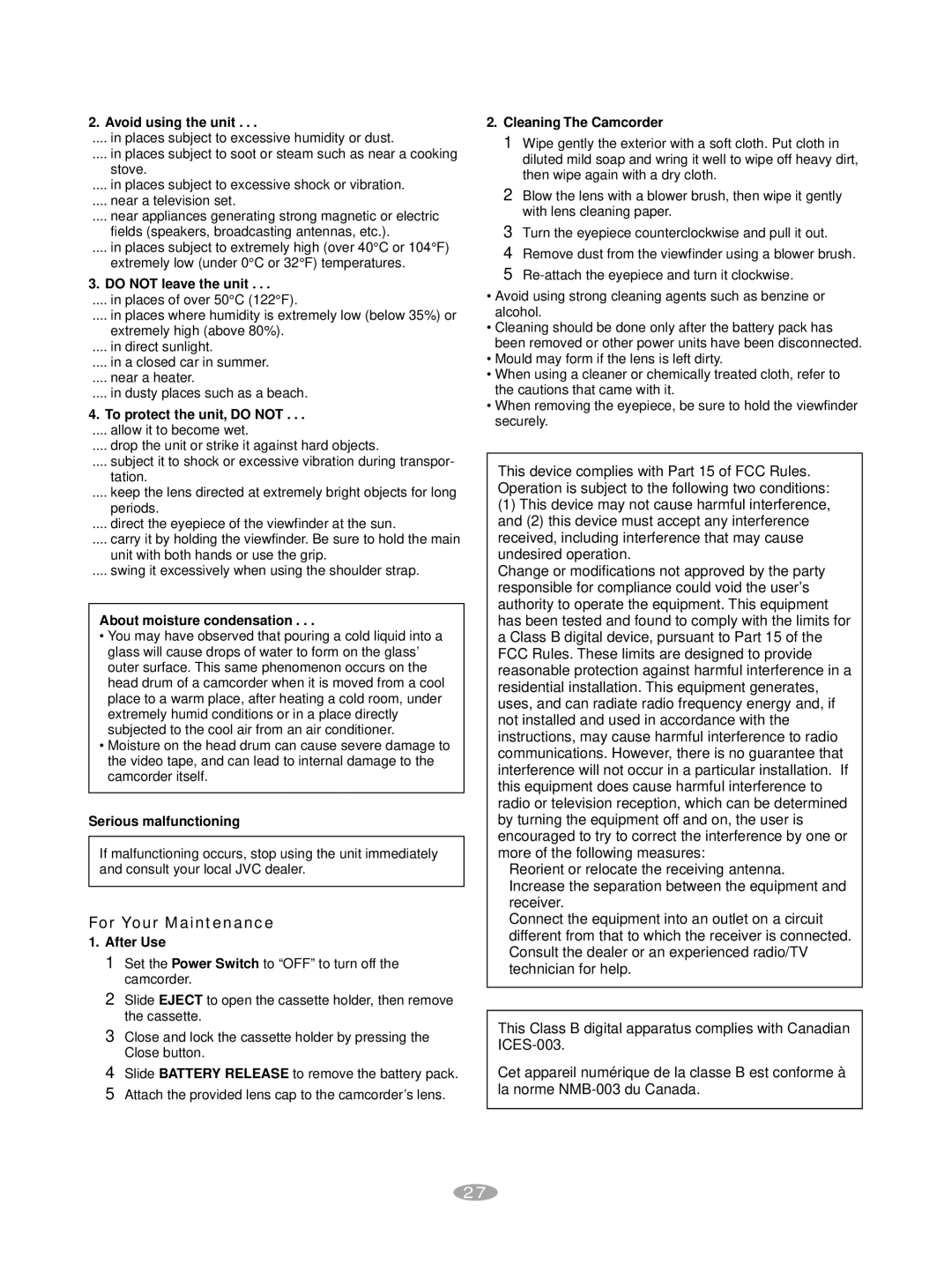
2. Avoid using the unit . . .
.... in places subject to excessive humidity or dust.
.... in places subject to soot or steam such as near a cooking
stove.
.... in places subject to excessive shock or vibration.
.... near a television set.
.... near appliances generating strong magnetic or electric
fields (speakers, broadcasting antennas, etc.).
.... in places subject to extremely high (over 40°C or 104°F)
extremely low (under 0°C or 32°F) temperatures.
3. DO NOT leave the unit . . .
.... in places of over 50°C (122°F).
.... in places where humidity is extremely low (below 35%) or
extremely high (above 80%).
.... in direct sunlight.
.... in a closed car in summer.
.... near a heater.
.... in dusty places such as a beach.
4.To protect the unit, DO NOT . . .
.... allow it to become wet.
.... drop the unit or strike it against hard objects.
.... subject it to shock or excessive vibration during transpor- tation.
.... keep the lens directed at extremely bright objects for long periods.
.... direct the eyepiece of the viewfinder at the sun.
.... carry it by holding the viewfinder. Be sure to hold the main unit with both hands or use the grip.
.... swing it excessively when using the shoulder strap.
About moisture condensation . . .
•You may have observed that pouring a cold liquid into a glass will cause drops of water to form on the glass’ outer surface. This same phenomenon occurs on the head drum of a camcorder when it is moved from a cool place to a warm place, after heating a cold room, under extremely humid conditions or in a place directly subjected to the cool air from an air conditioner.
•Moisture on the head drum can cause severe damage to the video tape, and can lead to internal damage to the camcorder itself.
Serious malfunctioning
If malfunctioning occurs, stop using the unit immediately and consult your local JVC dealer.
For Your Maintenance
1. After1Use
Set the Power Switch to “OFF” to turn off the
2camcorder.
Slide EJECT to open the cassette holder, then remove
3the cassette.
Close and lock the cassette holder by pressing the
4Close button.
5Slide BATTERY RELEASE to remove the battery pack. Attach the provided lens cap to the camcorder’s lens.
2. Cleaning1 The Camcorder
Wipe gently the exterior with a soft cloth. Put cloth in diluted mild soap and wring it well to wipe off heavy dirt,
2then wipe again with a dry cloth.
Blow the lens with a blower brush, then wipe it gently
3with lens cleaning paper.
4Turn the eyepiece counterclockwise and pull it out.
5Remove dust from the viewfinder using a blower brush.
•Avoid using strong cleaning agents such as benzine or alcohol.
•Cleaning should be done only after the battery pack has been removed or other power units have been disconnected.
•Mould may form if the lens is left dirty.
•When using a cleaner or chemically treated cloth, refer to the cautions that came with it.
•When removing the eyepiece, be sure to hold the viewfinder securely.
This device complies with Part 15 of FCC Rules. Operation is subject to the following two conditions:
(1)This device may not cause harmful interference, and (2) this device must accept any interference received, including interference that may cause undesired operation.
Change or modifications not approved by the party responsible for compliance could void the user’s authority to operate the equipment. This equipment has been tested and found to comply with the limits for a Class B digital device, pursuant to Part 15 of the FCC Rules. These limits are designed to provide reasonable protection against harmful interference in a residential installation. This equipment generates, uses, and can radiate radio frequency energy and, if not installed and used in accordance with the instructions, may cause harmful interference to radio communications. However, there is no guarantee that interference will not occur in a particular installation. If this equipment does cause harmful interference to radio or television reception, which can be determined by turning the equipment off and on, the user is encouraged to try to correct the interference by one or more of the following measures:
Reorient or relocate the receiving antenna. Increase the separation between the equipment and receiver.
Connect the equipment into an outlet on a circuit different from that to which the receiver is connected. Consult the dealer or an experienced radio/TV technician for help.
This Class B digital apparatus complies with Canadian
Cet appareil numérique de la classe B est conforme à la norme
27
